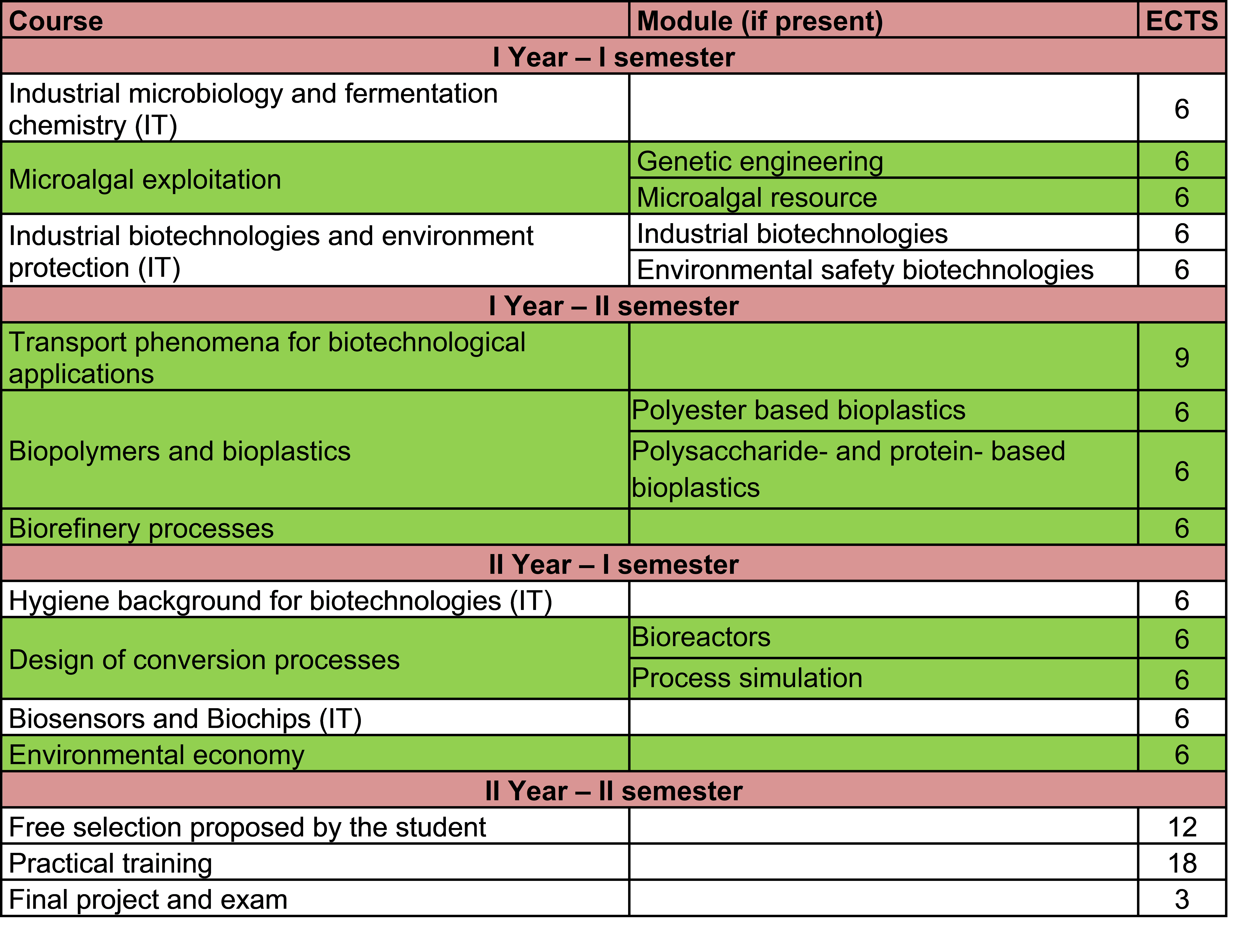MSc in Molecular and Industrial Biotechnology
- The aims of the MSc
- The structure of the MSc
- Lessons time and course tests schedules
- MSc final test
- Degree course regulations
The aim of the MSc in Molecular and Industrial Biotechnology
The MSc programme aims to educate graduated students for high profile positions in research centres, enterprises and industries operating in industrial biotechnology field. The programme:
- includes activities aimed at acquiring: (a) knowledge on the structure and function of biological systems, interpreted according to molecular and informational logics, from the cellular level to that of the organisms; (b) fundamental knowledge and techniques in various fields of industrial biotechnology, with particular attention to multidisciplinary approaches; (c) specialist skills in specific sectors of industrial biotechnology;
- provides the opportunity of external activities (e.g. internships in companies, public or private research institutes, traineeships in Italian and European universities) to strengthen skills in specific sectors of industrial biotechnology;
- includes - as a qualifying moment of the training - an experimental thesis carried out in academic research laboratories and/or in other public/private structures, including the results of an original scientific and technological research.
Potential fields of activity of MSc graduated students are biotechnological enterprises, chemical, pharmaceutical/cosmetic and nutraceutical industries, as well as the environmental technology sector. The MSc graduated students will be able to operate covering positions of high responsibility, including technical, economic and legal implications.
The programme includes two curricula:
“BiRRe - Biotechnology for Renewable Resources”
“ProBio - Biotechnology productions”
The lessons of the BiRRe curriculum are in English and Italian languages: 6 courses - for a total of 60 CFU spread over a period of one year – are provided in English language and 4 courses - for a total of 30 CFU spread over a period of one year – are provided in Italian language. The topics of BiRRe curriculum are focused on molecular and industrial issues of biotechnology to prepare students to the construction of new products and services based on the exploitation of renewable resources. Students are provided with the interdisciplinary concepts of industrial biotechnology to convert renewable resources in consumables (e.g. energy vectors, bioplastics, pigments, nutraceuticals). Both classes of biotechnology products, i.e. high value products (e.g. antioxidants) and high massive products (e.g. energy vectors, bioplastics) are addressed.
The lessons of the ProBio curriculum are provided in Italian language: 9 courses, for a total of 90 CFU spread over a period of half a year. The topics of ProBio curriculum are focused on molecular and industrial aspects of biotechnology to educate students to a general integrated approach to consolidated and emerging technologies.

The MSc lessons are hold at the Complesso Universitario di Monte S. Angelo. Lab activities are also in this area.
The structure of the MSc in Molecular and Industrial Biotechnology

(IT) – course language: Italian
Details of each course/module are reported at the webpage of the professor.
The list of records of course/modules of the courses held in English language.
Education period (typical):
I Semester – From the end of September up to the beginning of Christmas holiday
II Semester – From the beginning of March up to the beginning of June
Exams – January to March. June, July, September and October
Course | Module (if present) | ECTS |
I Year – I semester | ||
Industrial microbiology and fermentation chemistry (IT) | | 6 |
Microalgal exploitation | Genetic engineering | 6 |
Microalgal resource | 6 | |
Industrial biotechnologies and environment protection (IT) | Industrial biotechnologies | 6 |
Environmental safety biotechnologies | 6 | |
I Year – II semester | ||
Transport phenomena for biotechnological applications | | 9 |
Biopolymers and bioplastics | Polyester based bioplastics | 6 |
Polysaccharide- and protein- based bioplastics | 6 | |
Biorefinery processes | 6 | |
II Year – I semester | ||
Hygiene background for biotechnologies (IT) | | 6 |
Design of conversion processes | Bioreactors | 6 |
Process simulation | 6 | |
Biosensors and Biochips (IT) | | 6 |
Environmental economy | | 6 |
II Year – II semester | ||
Free selection proposed by the student | | 12 |
Practical training | | 18 |
Final project and exam | | 3 |
- DEGREE COURSE REGULATIONS
Enrolled starting from the 2025-26 academic year: download the Regulations.
Enrolled starting from the 2023-24 academic year: download the Regulations.



